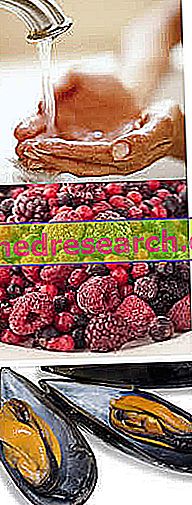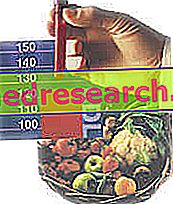Vomiting is an unpleasant symptom which consists in the rejection of the gastric contents outside the body.

Sometimes, vomiting is preceded by nausea.
The physiological mechanism that causes vomiting could be simplified in three steps: stimulation of the cerebral emetic center, preparation of the sphincters and muscles, resulting in inverse peristalsis.
The causes of vomiting are many; among the most common and least serious are:
- Acute and chronic diseases, anatomical compromises and infections of the digestive system.
- Motion sickness, abnormal stimulation of the vestibular nerve and labyrinthitis. (lesion of the inner ear).
- Constipation / gastro-intestinal blockage, food intolerances, poisoning (including alcohol and drugs) and poisoning.
- Prolonged fasting (feeling of emptiness in the stomach, hypoglycemia, low blood pressure).
- Emotionality (anxiety, panic, disgust, etc.).
- Pregnancy.
Vomiting does not allow eating and drinking properly.
If prolonged, it alters the nutritional status of the subject; of consegunza arise: dehydration, hypotension, hypoglycemia, hypokalemia etc.
In particular circumstances, vomiting can have even more serious consequences (esophageal bleeding, etc.).
What to do
- Vomiting requires specific treatment for the condition in question. Nevertheless, they are always indispensable:
- Proper diet.
- Appropriate lifestyle.
- Respect the right hours of sleep.
- Ban alcohol, large amounts of coffee, cigarette smoke and drugs.
- Stay in cool, breathable and uncrowded environments.
- Possibly take specific drugs.
- Possibly adopting specific medical practices such as surgery.
- Digestive problems such as constipation and food intolerances require a specific diet:
- Exclusion of products that can cause food intolerance (lactose or gluten)
- Reduction in the total volume of meals. Portions and individual morsels must be moderate.
- Respect a chewing rhythm and a minimum time within which to eat the meal.
- Prefer digestible foods (chemically and physically).
- Lie down after at least an hour from the main meals and prefer the seats with respect to the bed (at least during the day).
- If there is a loss of control over food (typical of some eating disorders), vomiting can be spontaneous or self-induced. In both cases it is advisable to use a specialized medical center.
- The vomiting from motion sickness can be fought by preventing dizziness and nausea. This can be achieved:
- Taking anti-emetic drugs.
- Eating dry and digestible foods.
- Focusing on the trajectory of the vehicle anticipating the deviations, focusing on the road, the horizon or a stationary object.
- It should be possible to drive the means of transport.
Since there is no cure for labyrinthitis, the consequent vomiting can be combated with anti-emetic drugs and lodging.
- In pregnancy and in all cases of vomiting triggered by emotional or psychological reasons, in addition to following a proper diet, it may be necessary to adopt one or more of the following options:
- Advanced relaxation techniques and mental training.
- In agreement with a therapist, perform psychotherapy.
What NOT to do
In case of a tendency to vomit it is absolutely not recommended to increase the levels of psychological stress, emotional distress and general fatigue.
Better to avoid:
- Lack of sleep (we advise against resting in a prone position and / or with a declined head).
- Heavy jobs (including domestic ones).
- Sport activity.
- Unpleasant or exhausting family duties.
- Excessive mental commitments.
- Stay in long closed, crowded, noisy, hot or polluted.
NB . In case of loss of consciousness it is necessary to place the body on its side to prevent suffocation from vomiting.
Furthermore, it is recommended to avoid:
- Drink large quantities of water, drinks or liquid food.
- Eat large amounts of food, quickly, chewing a little, preferring foods that are not easily digested or containing irritating stomach molecules.
- Fast.
- Take unnecessary or responsible medicines for vomiting.
- Smoking, using drugs (even reading) and drinking alcohol.
- Move with public transportation or in the back seat of the car.
What to eat
- Dry foods able to absorb digestive juices.
- Digestible foods. They are those rich in carbohydrates, low in fat, not too high in protein and cooked properly.
- Functional foods.
The most suitable foods are:
- Lean bread crust, biscuits, wasa bread, unsalted crackers, etc.
- Rice and pasta.
- Potatoes, carrots and green beans.
- Dehulled legumes.
- Bananas.
The most suitable cooking systems are:
- Drowning (boiling in water), also vacuum packed.
- Steam powered
- In a pressure cooker
- Vasocottura.
They are also allowed to be cooked in a pan on a medium flame and in an oven baked in MA.
The functional foods hypothetically capable of reducing nausea are:
- Fresh ginger.
- Root or liquorice extract.
- Coca-cola (even if the reason is not clear).
- Ginger ale (it is a ginger drink).
- Specific herbs and herbal teas allowed during pregnancy (see below).
Some suggest the use of mint, although it is part of the foods not recommended for gastro esophageal reflux.
What NOT to Eat
- Foods that are too liquid or oily
- Indigestible or poorly digestible foods. These include foods rich in fats, proteins, dietary fiber, raw or overcooked (especially meat).
- Irritating and / or harmful foods. For example, very spicy, salty, charred, fried in oil, etc.
The least advisable products are:
- Fat meat broth.
- Whole milk and fat cheeses.
- Cured meat.
- Fatty and / or stewed or fried meats and fish.
- More than two eggs at a time (especially in omelette).
- Fried vegetables.
- Creamy or fat desserts.
- Sweet and savory snacks.
- All foods that are too salty or rich in chilli and pepper.
- Chocolate.
- Mint.
- Coffee.
- Alcoholic beverages.
Natural Cures and Remedies
- Dry ginger extract (up to 1 gram per day)
- Liquid extract of: salicaria, cardo santo, sambuco * and nettle *; two teaspoons diluted in a little water 3 times a day.
- Infusion 1: centaurea minor *, chamomile, mallow and mint.
- Infusion 2: juniper *, plantain *, borage *, elm * and polypody.
- Infusion 3: aromatic calamus *, fibrino clover, enula *, linden flowers, chamomile.
NB . The products marked with an asterisk (*) are those potentially inconvenient for the pregnant woman.
Pharmacological care
- Anticholinergic-antispastic drugs for the treatment of vomiting: Meclizine, Trimetobenzamide and Scopolamine.
- Motility stimulating drugs for the treatment of vomiting: Metoclopramide and Domperidone.
- Dopamin antagonist drugs for the treatment of vomiting: Chlorpromazine, Perfenazine and Proclorperazine
- Antihistamines for the treatment of vomiting: Dimenhydrinate, Promethazine, Hydroxyzine.
Prevention
To avoid the onset of vomiting it is first of all necessary to understand and avoid or treat the causative agent. Some are predictable (pregnancy, anxiety, motion sickness, etc.), others are not (infections, digestive blocks, etc.).
Certain behaviors such as:
- Avoid eating quickly or excessively.
- Avoid abuse of alcohol, other nerves and drugs.
- Restart the diet in 5 meals a day, choosing the appropriate ones and excluding the least tolerated.
- Ensure optimal nutritional status.
- Take anti-emetic drugs and ban those that cause vomiting.
- Practice mental training or advanced relaxation techniques.
- Get enough sleep.
- Avoid awkward situations (mental stress, disgusting situations, etc.) and, if necessary, use anxiolytics.
- Avoid exposure to contaminants, pollutants or odors that can trigger vomiting.
Medical treatments
Medical treatments to treat vomiting are limited to pharmacological use.
Besides the pharmacological one, there are no other common methods to improve this condition.
Mental / psychological training is a very effective system but requires rather significant commitment and dedication.
In some cases of diseases that affect the digestive system such as the presence of adhesions, gallstones, stenosis, etc., surgery can prove to be decisive.



